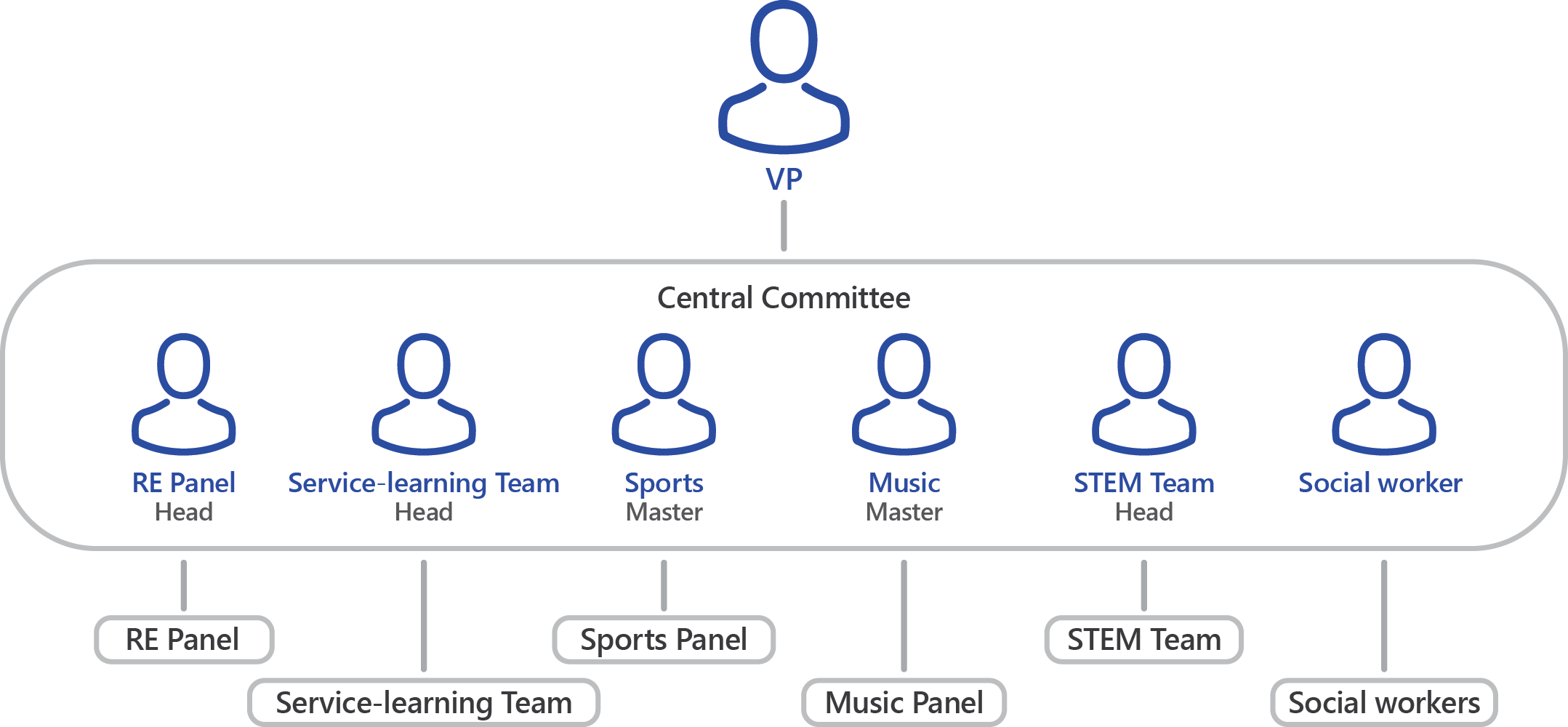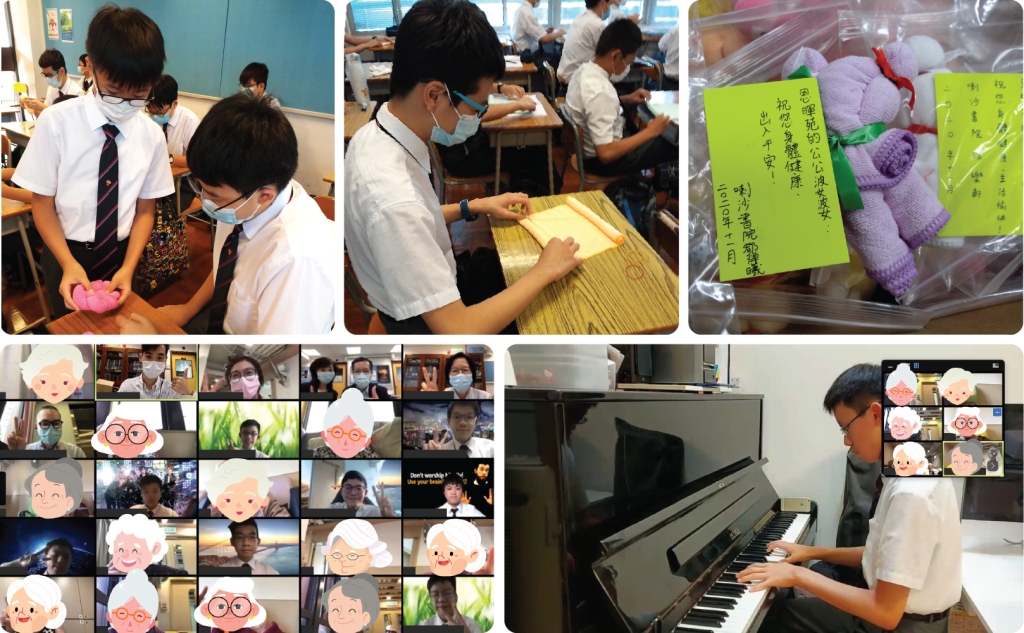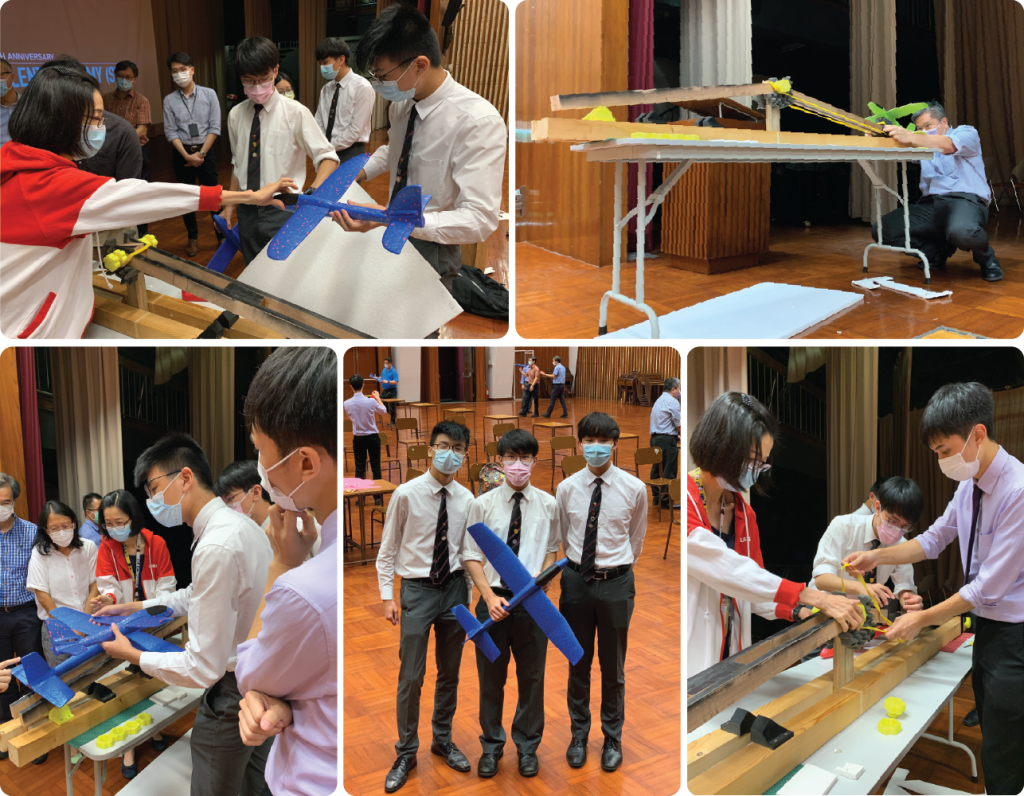Participating school sharing
Relationship crafting
(in charge of the Pastoral Council to review and develop policies regarding student support issues)
Background of the initiative – La Salle Talent Academy
The Pastoral Council have been actively promoting the data-driven P-I-E cycle since 2018. Functional team heads planned their upcoming activities with reference to the evaluation data. In 2020, the Council collected data from various teams and identified issues to be addressed: “Most students believe that academic results are far more important than serving the needy. The school does not have a strong atmosphere of serving others.” What LSC needs is to instil into students the spirit of serving others, especially the less fortunate. To make it happen, I proposed to make good use of students’ talents in sports, music and science to serve. The quantity of service records is not our major concern. We aim at inspiring the underprivileged to overcome obstacles and achieve excellence. Therefore, l decided to launch a 6-month service project called “La Salle Talent Academy” (LSTA).
What has been done?
The LSTA project aims at engaging 100 talented students from LSC to design and conduct 2-month
short-term courses in three areas – sports, music and STEM. LSC teachers and/or coaches are the advisors. The target recipients are 300 primary 5-6 pupils who may not have exposure to a wide variety of ECA. The highlight of the LSTA is to invite parents and teachers to celebrate their achievement in a half-day programme, called “Talent Academy Showcase Day.”
However, the COVID-19 epidemic has been affecting all walks of life all over the world. Students have to go online for lessons, and other school activities have almost come to a standstill. Nevertheless, I will share with you the work of the LSTA so far, and how I applied the 3Cs concept that I have learnt, especially relationship crafting, in my preparation work of the LSTA.
Building a cohesive network among colleagues
I set up a central committee consisting of six key persons who have expertise in sports, music, STEM, liaising, organising service-learning events and implementing positive education. Each person, in turn, forms a sub-group with around 4-5 teachers. I, the chairperson of the central committee, hold regular meetings with these group leaders and work with them closely in their sub-groups to get immediate and direct feedback.

Giving autonomy to the sub-groups
As chairperson, I sit in every sub-group meeting. I give the sub-group the autonomy in the decision-making process, and I support the final decision if the plan is feasible. In each of the sub-groups, they have to design the contents of the LSTA short courses, recruitment matters and the timeline of the implementation. Then, I must optimise available resources in the school to make their tasks possible. Finally, each of the sub-groups finalises the contents of the LSTA, the promotion matters and the logistics of the “Talent Academy Showcase Day”.
Conducting teachers’ training
Apart from the introduction of the LSTA for teachers during a professional development day or staff meeting, I connect the LSTA project objectives with teachers’ professions, restating the philosophy of our college founder St. John Baptist de La Salle, who encouraged Lasallian educators to touch the heart of our students and transform lives. To strengthen the atmosphere of serving others, I aim to change teachers’ mindset to value community services. I believe that it is worthy of nurturing our students’ serving spirit through active participation to realize our school’s mission.
Our achievement
Even though the LSTA cannot launch as expected in the academic year 2020-21, online lessons inspired us. Two of the sub-group leaders proposed alternative pilot plans. The first one came from the service-learning sub-group and the second one from the STEM sub-group.
Pilot online visit to elderly home
Every year, our F2 students visit the elderly living in NGO homes. This programme has been a tradition of the school for almost 20 years. During the epidemic, the service-learning sub-group and the social worker boldly worked on a pilot project – for our students to visit the elderly living in elderly homes online. Preparations were made; logistics were planned, and students were trained. From pictures and videos, we see the joyful faces of both the elderly and the students, and we know that our students have gained a fruitful experience.

After completion of the above pilot plan, I conducted the training workshop with the teachers. I decided not to tell teachers about the positive effects of serving others directly. Instead, I showed my colleagues the evidence, including the reflection essays written by our students after online visits and those happy faces on the elderly. Teachers watched the video clips on how the elderly responded enthusiastically to the students in their visits and how the NGO home staff complimented the students’ creativity and passion for caring for the elderly.
Pilot STEM course
The STEM sub-group initiated the idea of testing all their preparation work. It was not possible to conduct a trial run with primary school pupils during the epidemic. I decided to add a teacher training workshop session and to invite teachers to pretend to be the target participants. Members from the STEM sub-group and recruited voluntary students were to pilot the STEM course as prepared, teaching the “participants” about the principle of flight and how to make a model plane that can fly high and far. The STEM sub-group received valuable feedback from our Science and D&T teachers on the rundown of the pilot programme and modification tips. The participating teachers’ response proved that providing real experience through teachers’ active participation was more effective than attending a seminar.

Reflection
As an edupreneur, it is crucial to push the school forward and have teachers carry out changes. He/she needs to expand the capacity, connect their schools’ vision and mission to their team, and actualise the vision. The relationship crafting is essential because of the 3Cs (Competence, Character and Care) qualities behind a great service leader.
Relationship crafting – building a cohesive network
To build a strong team, a great service leader must support their team and the sub-groups. Choose the right person who is willing to help but not assign a person by their post. For example, when I choose a person to take charge of the sports programme of the LSTA, I do not necessarily assign the P.E. Master as the team leader. Instead, I assign a P.E. teacher enthusiastic about developing kids’ athletic talent and is willing to help. Besides that, some people may say that the chairperson might be too busy to sit in all sub-group meetings. Considering that the LSTA is a one-off event, it is in my best interest to participate in those meetings to show my support to the colleagues and get direct and instant feedback from members of the sub-groups.
Relationship crafting – Task crafting
A great service leader must give autonomy to a team leader to take the initiative to make their own plan. For example, the STEM sub-group of the LSTA had a fierce debate on what they would offer to primary pupils, either teaching them flight simulation software or a robotics programme. A service leader must facilitate fruitful discussion among members and allow a free flow of ideas. When the final decision is made, what a service leader does is to support it and optimise the school resources for the tasks, such as coordinating with the person-in-charge of the Aerospace Laboratory to book necessary flight simulation equipment.
Most importantly, a service leader must respect the decision. For example, it sounds more attractive if the LSTA offers football training or competitions (as one of the sports programmes) to the target participants in our school’s large artificial turf. However, the Sports sub-group of the LSTA has made a final decision and designed an athletic course based on the IAAF Kids Athletics Practical Guides. I should show full respect to the sub-group’s final decision.
Relationship crafting – Cognitive crafting
“Seeing is believing” is the most effective tool to change teachers’ mindsets in cognitive crafting. The effect can raise it to an even higher level with “3A”:
“A” - acquisition of knowledge based on the evidence
“A” - accompanying team leader and their team members to build a cohesive network
“A” - action to be taken by teachers/team members to let them experience
Principal’s comments
I sincerely hope that the La Salle Talent Academy can be launched successfully in the near future to inspire our students and teachers to serve, as well as to aspire the target participants for excellence.
Sharing from other schools (2020/21)
Sharing from other schools (2021/22)
S.K.H. Chu Yan Primary School
S.K.H. Holy Carpenter Primary School
S.K.H. Yuen Chen Maun Chen Jubilee Primary School
Sam Shui Natives Association Huen King Wing School
Shanghai Alumni Primary School
Shun Lee Catholic Secondary School
Tai Kok Tsui Catholic Primary School
Yan Chai Hospital Choi Hin To Primary School
